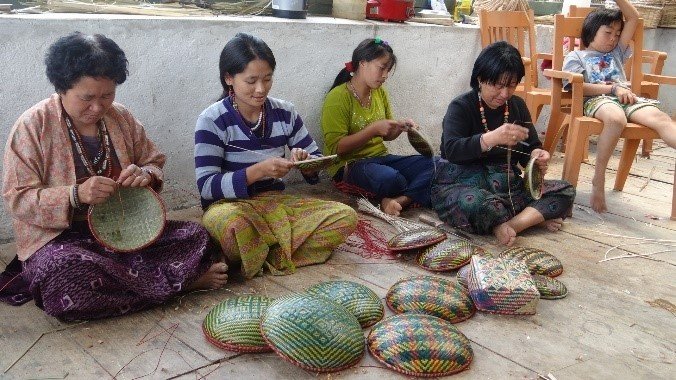Through participating in an ADB-supported RSPN – ENERGIA training programme on the use of electricity for production, product improvement and skills enhancement, bamboo crafter Ugyen Choden (second from left) has more than doubled her income.
Ugyen Choden is a 27-year-old single mother of two who lives in the village of Bjoka Trong in Lower Zhemang, Bhutan. Apart from farming a small plot of land, and like most of the villagers, Ugyen weaves and sells bamboo and cane products for a living. Among her offerings are Bangchung (pairs of bowl-like containers), Dzem (baggage baskets for ponies) and Baylow (flat hats). With training delivered by the Royal Society for Protection of Nature (RSPN), Ugyen has been able to considerably boost her income.
The training was part of the ENERGIA project, funded by the Asian Development Bank, to improve gender-inclusive access to clean and renewable energy in Bhutan, Nepal and Sri Lanka. The core of the programme focussed on the use of electricity for production, product improvement and skills enhancement, but it also covered aspects such as product diversification and quality enhancement, sustainable resource management and aspects related to income-generation, marketing and service delivery. It included practical demonstrations on developing new Bangchung patterns as well as making end rings and other finishing stitching.
Newly attained skills lead to higher income
Following the training, Ugyen’s products have been more consistent and, as part of product diversification, she now makes pen stands and Dappa containers; she also uses Sem-Rig Bangchung patterns. Ugyen has seen that the pen stands sell especially well, and she has sold over 300 pieces, fetching between Nu 100 and Nu 150 (roughly USD 2) per item. Sales are made through the production group that the training participants started together, as well as through a private dealer who visits the village to purchase merchandise.
Prior to the training, Ugyen had little income. Now, her average monthly income is Nu 3,500, almost double the 2012 national poverty level of Nu 1,704. She uses this income to cover her childrens’ educational costs and to meet her daily needs. Ugyen tells us, “I had to follow in my parents’ footsteps, because I have no other skills, but, with this training, I have learned new things and now my products are better and I sell more”.
Realising large dreams, one step at the time
Ugyen has great plans for the future. She wants to grow Yula bamboo on her own land for commercial use. This is a stronger type of bamboo, ideal for crafting. It used to be abundant in the vicinity, but now people have to travel for up to four hours deep into the forest to find it. More immediately, Ugyen is eager to learn how to make rubbish bins from the regular bamboo which is readily available in her village. She is glad that she received the training, and is also happy that her village is now connected to the grid. The Bjoka Bamboo Craft Cooperative Group’s centre is now electrified, which enables the group to listen to the radio while working and to cook with electric appliances that saves her a considerable amount of time.











Follow us on: